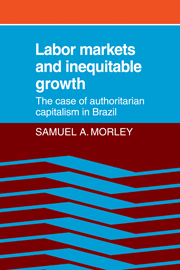Book contents
- Frontmatter
- Contents
- List of tables and figures
- Preface
- Part I Growth, employment creation, and inequality in Brazil
- Part II The effect of supply and demand on labor markets during rapid economic growth
- 6 Migration and the modernization of the agricultural labor force
- 7 The absorption of migrants into the urban economy
- 8 Trends and theories of the wage differential during economic growth
- 9 The market for skilled labor
- 10 Agriculture, wage policy, and the wages of unskilled labor
- 11 Additional perspectives on inequitable growth in Brazil
- 12 Conclusions
- Data appendix
- Bibliography
- Index
10 - Agriculture, wage policy, and the wages of unskilled labor
Published online by Cambridge University Press: 07 October 2011
- Frontmatter
- Contents
- List of tables and figures
- Preface
- Part I Growth, employment creation, and inequality in Brazil
- Part II The effect of supply and demand on labor markets during rapid economic growth
- 6 Migration and the modernization of the agricultural labor force
- 7 The absorption of migrants into the urban economy
- 8 Trends and theories of the wage differential during economic growth
- 9 The market for skilled labor
- 10 Agriculture, wage policy, and the wages of unskilled labor
- 11 Additional perspectives on inequitable growth in Brazil
- 12 Conclusions
- Data appendix
- Bibliography
- Index
Summary
The market for unskilled labor is influenced by all the same factors of supply and demand that we have analyzed for skilled labor in Chapter 9. However, two factors deserve special attention in this market: agriculture and minimum-wage policy. Agriculture is the basic employer of unskilled labor. If it grows rapidly, unskilled labor is retained in the countryside and need not flood the urban labor market. A prosperous and expanding agricultural sector provides cheap food to the cities and jobs for the unskilled. This is progressive because it hastens the moment when the economy reaches the turning point at which the elimination of surplus labor begins to narrow the unskilled wage differential.
In Brazil, the government has a direct impact on wages for the unskilled through its control of the minimum wage. Since 1964, the government has systematically held down the minimum wage in real terms, particularly during the stabilization period, 1965–68. This intervention by the government, perhaps more than any other, has been a source of controversy. For when the income distribution became significantly less equal over the same period, critics of the government were not long in singling out wage policy as the chief cause.
The chapter begins with a discussion of the trends in output, employment, and productivity in agriculture. It then goes on to a discussion of government wage policy. After a short description of that policy, we present a theory of the rural–urban wage rates for unskilled labor.
- Type
- Chapter
- Information
- Labor Markets and Inequitable GrowthThe Case of Authoritarian Capitalism in Brazil, pp. 233 - 265Publisher: Cambridge University PressPrint publication year: 1983



